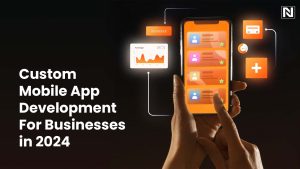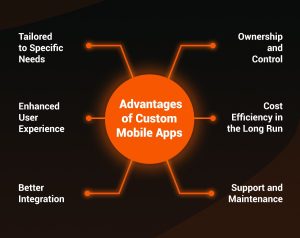 As a visionary business leader, you’re empowered to leverage mobile technologies to propel your organization ahead of the competition. But with so many options available, where do you start? Should you choose an off-the-shelf solution or take the plunge into custom mobile app development? The power is in your hands.
As a visionary business leader, you’re empowered to leverage mobile technologies to propel your organization ahead of the competition. But with so many options available, where do you start? Should you choose an off-the-shelf solution or take the plunge into custom mobile app development? The power is in your hands.
While the first option may seem attractive in its immediacy, a custom-built app offers unique benefits that are worth the initial investment and time spent consulting with a mobile development studio.
At first glance, the convenience of an off-the-shelf solution is the obvious choice. But that might only be true if you consider your organization’s needs through a short-term lens.
For instance, if you’re running a startup with limited resources, an off-the-shelf solution may seem sufficient. However, it’s important to consider how well it will serve you as your business grows or when you need features it doesn’t offer. Will you then switch to another ready-made solution to cover the gaps, or will you choose a custom-built mobile app designed specifically to meet your evolving requirements?
Relying on multiple off-the-shelf solutions could complicate your organization’s tech infrastructure. Plus, each new tool will require your staff to undergo training, which can be challenging, especially when they’re needed for critical tasks that keep your organization running smoothly.
Fortunately, you can avoid these challenges by opting for custom mobile app development. By developing a custom-built app, your organization can harness the latest trends and receive a solution precisely tailored to meet your unique needs.
What is Custom Mobile App Development?
Custom mobile app development entails creating mobile applications tailored to address the unique requirements of a specific business.
Unlike generic off-the-shelf apps, which cater to a broad audience, custom mobile apps are developed to address a specific organization’s unique challenges and objectives. These apps are built with features and functionalities that align with the organization’s goals and the needs of its end customers.
This tailored approach enables businesses to create a truly unique mobile app, offering them a significant competitive edge in the marketplace.
Differences Between Custom Mobile Apps and off-the-shelf Solutions
Businesses often choose custom mobile app development because it provides a distinct advantage over off-the-shelf solutions.
Although off-the-shelf apps might appear convenient and budget-friendly, they frequently fail to address users’ needs thoroughly.
The table below outlines the key differences between custom mobile apps and off-the-shelf solutions, emphasizing the benefits of opting for a tailored mobile app development approach.
| Feature | Custom Mobile Apps | Off-the-Shelf Solutions |
| Customization | Tailored to specific business needs and branding. | Limited customization options. |
| Functionality | It can include unique features and integrations. | Standard features with little flexibility. |
| Scalability | Scalable according to business growth and needs. | Limited scalability, often fixed functionality. |
| Cost | Higher initial cost due to development from scratch. | Lower initial cost, often subscription-based. |
| Development Time | Longer development time for unique functionalities. | Quick deployment, ready-made solutions. |
| Maintenance & Updates | Requires ongoing maintenance and updates. | Updates managed by provider; minimal maintenance. |
| Integration | Easily integrates with existing systems. | Limited integration capabilities. |
| Support | Dedicated support from developers. | The vendor’s support needs to be tailored. |
| Security | Customizable security features and protocols. | Standard security measures may lack customization. |
| Ownership & Control | Full ownership and control over the app. | Limited control over updates and features. |
Did You Know?
As reported by Statista , global consumer spending on mobile apps reached 35.28 billion U.S. dollars, marking nearly a five percent increase compared to the same quarter in 2023. This underscores the importance of developing a custom mobile app to boost consumer engagement and strengthen your online market presence.
According to Gartner The global enterprise application software market reached $340 billion in 2023, reflecting a growth of 13.1% in constant currency and 13.3% in current U.S. dollars. By 2027, this market is expected to expand to $569 billion, driven by a compound annual growth rate of 13.0% in constant currency from 2022 to 2027.
Advantages of Custom Mobile Apps
Custom-built applications are transforming businesses worldwide, delivering significant advantages beyond just a competitive edge. Here are some additional benefits of custom mobile apps:

- Tailored to Specific Needs
Custom mobile apps are designed to meet a business’s unique requirements, ensuring that the app’s functionality aligns precisely with the organization’s goals and workflows.
- Enhanced User Experience
With custom apps, you can create a user experience that is optimized for your target audience. This includes personalized features, intuitive navigation, and a design that reflects your brand’s identity.
- Better Integration
Custom apps can be integrated seamlessly with existing systems and databases, providing a more cohesive experience and improving overall efficiency.
- Ownership and Control
When you develop a custom app, you retain full ownership and control over the software. This means you can make updates, changes, and enhancements as needed without relying on a third-party vendor.
- Cost Efficiency in the Long Run
While the initial development cost of a custom app may be higher, it can be more cost-effective over time. Custom apps eliminate the need for expensive licensing fees and offer better long-term value by avoiding costly workarounds.
- Support and Maintenance
Custom apps often come with dedicated support and maintenance services, ensuring that any issues are addressed promptly and that the app continues to meet your needs.
Custom Mobile App Development Types
Selecting the right development approach for your app is a critical next step. Here, we explore two types of custom mobile applications:
| Type of Mobile App | Description | Best For |
| Native Mobile Apps | They are built specifically for a single platform (iOS, Android) using platform-specific languages (Swift for iOS, Kotlin/Java for Android). | High performance, platform-specific features, and a superior user experience. |
| Hybrid Mobile Apps | Developed using web technologies (HTML, CSS, JavaScript) and wrapped in a native shell, enabling them to run across multiple platforms. | Cost-effective, quicker development, and cross-platform compatibility. |
| Progressive Web Apps (PWA) | Web applications that function like native apps with offline capabilities and can be installed on devices via a web browser. | Businesses need an app-like experience without full native app development. |
| Cross-Platform Mobile Apps | It was developed using frameworks like React Native or Flutter, allowing a single codebase to run on both iOS and Android platforms. | Reducing development time and cost while targeting multiple platforms. |
| Enterprise Mobile Apps | It is tailored for large organizations to improve internal processes, communication, and productivity. Often involves integrations with existing enterprise systems. | Large businesses and corporations are looking to streamline operations. |
| On-Demand Mobile Apps | Applications that connect users with services or products in real-time (e.g., Uber, DoorDash). | Service-based industries, real-time user interaction, and marketplace platforms. |
| Gaming Apps | Specialized apps focused on delivering engaging and interactive gaming experiences, often using advanced graphics and technology. | Game developers, entertainment industries, and interactive user experiences. |
| E-Commerce Mobile Apps | Designed for shopping and transactions, these apps provide a seamless mobile shopping experience with payment gateways, product catalogs, and user profiles. | Retail businesses, online marketplaces, and e-commerce platforms. |
| Social Media Mobile Apps | They are focused on social interaction, content sharing, and community building, with features like messaging, photo sharing, and status updates. | Social networking platforms, content-sharing communities, and user engagement. |
| Healthcare Mobile Apps | They are designed to support patient care, fitness tracking, health monitoring, and appointment scheduling. It often includes features like telemedicine and medical records. | Healthcare providers, fitness enthusiasts, and wellness centers. |
Build Your Custom Mobile App With Nirvana Lab
At Nirvana Lab, we are a custom mobile app development company dedicated to transforming your vision into a powerful app that drives success and growth. Our team of experts delivers tailored solutions that perfectly align with your unique business goals. Using the latest technology and industry best practices, we create apps that are not only high-performing and user-friendly but also scalable to meet future demands.
Imagine a mobile app that enhances customer engagement, streamlines operations, and sets you apart from the competition. Partner with Nirvana Lab and let us turn your ideas into a standout mobile app that propels your business forward.
Frequently Asked Questions
What is custom mobile app development?
Custom mobile app development involves designing and building mobile applications specifically for a business’s unique requirements. Unlike off-the-shelf apps, custom apps are tailored to address your organization’s particular needs and goals, providing a more personalized solution.
How does a custom mobile app differ from off-the-shelf solutions?
Custom mobile apps are developed to meet the specific needs and preferences of your business, offering unique features and functionalities. Off-the-shelf solutions, on the other hand, provide generic features that might not fully align with your organization’s specific requirements and may require additional workarounds.
What are the main advantages of custom mobile apps?
Custom mobile apps offer several benefits, including a tailored user experience, seamless integration with existing systems, complete control and ownership, and potentially lower long-term costs. They are designed to meet your exact needs and can adapt as your business grows.
What types of custom mobile apps are available?
There are several types of custom mobile apps: native apps for specific platforms, hybrid apps for cross-platform use, Progressive Web Apps (PWAs) for a web-like experience, cross-platform apps for multiple operating systems, and enterprise apps for internal processes. Each type serves different purposes depending on your business goals and user needs
Why should I choose Nirvana Lab for mobile app development?
Nirvana Lab specializes in creating custom mobile apps that align perfectly with your business objectives. Their team uses cutting-edge technology and industry best practices to develop high-performance, user-friendly apps that are scalable and designed to drive your business success and growth.